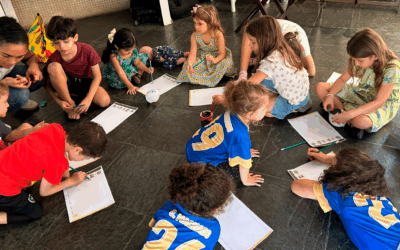 Five hundred people of all ages came from three regions of central Italy. They included lay people, priests and three bishops: Bishop Secchia from Teramo, Archbishop Petrocchi from Aquila and Bishop De Luca from Termoli. They came together for a conference of the Diocesan Movement of the Focolare, taking place on August 29, 2013 – September 1, 2013. The event drew people from six Italian diocese to share projects that focused on the New Evangelization. Together they attempted to come up with a work model for dealing with new challenges and prospects being faced by local churches.
Five hundred people of all ages came from three regions of central Italy. They included lay people, priests and three bishops: Bishop Secchia from Teramo, Archbishop Petrocchi from Aquila and Bishop De Luca from Termoli. They came together for a conference of the Diocesan Movement of the Focolare, taking place on August 29, 2013 – September 1, 2013. The event drew people from six Italian diocese to share projects that focused on the New Evangelization. Together they attempted to come up with a work model for dealing with new challenges and prospects being faced by local churches.  They spoke about open churches as described by the Pope, capable of welcoming everyone into the great family that is at the service of God. Grouped by age, they shared their experiences, with the aim of then reaching out to their local environments. Beginning with a comprehensive holistic approach, they discussed ways of offering continuing education throughout the journey to adulthood. They shared projects that engaged entire cities, at times entire diocese. In the city of Ascoli, for example, the local bishop sent Christmas greetings to the newly-elected mayors and this simple gesture was the start of a very effective collaboration. Now there are several projects in support of the disadvantaged in that region in collaboration and with the support of the municipality. For many years in the city of Pesaro there has been cooperation between the Orthodox world and groups of young people (especially from Romania) who have brought a wind of hope for ecumenism in that region. In Fermo and Teramo musical bands were begun: Eis (meaning ‘one’ in Greek) and Hope, that bring a message of peace and hope. What came into evidence in the various workshops was the impact of the community on the local environment. So why not apply this experience on a vaster scale? It could also be a way of increasing the fraternity within a diocese.
They spoke about open churches as described by the Pope, capable of welcoming everyone into the great family that is at the service of God. Grouped by age, they shared their experiences, with the aim of then reaching out to their local environments. Beginning with a comprehensive holistic approach, they discussed ways of offering continuing education throughout the journey to adulthood. They shared projects that engaged entire cities, at times entire diocese. In the city of Ascoli, for example, the local bishop sent Christmas greetings to the newly-elected mayors and this simple gesture was the start of a very effective collaboration. Now there are several projects in support of the disadvantaged in that region in collaboration and with the support of the municipality. For many years in the city of Pesaro there has been cooperation between the Orthodox world and groups of young people (especially from Romania) who have brought a wind of hope for ecumenism in that region. In Fermo and Teramo musical bands were begun: Eis (meaning ‘one’ in Greek) and Hope, that bring a message of peace and hope. What came into evidence in the various workshops was the impact of the community on the local environment. So why not apply this experience on a vaster scale? It could also be a way of increasing the fraternity within a diocese.  The bishops present were unanimous in welcoming the idea. In order to open itself to the existential peripheries, the community had to interrogate itself, be confirmed by its brothers and sisters and increase the unity among all. Final proposals included: to work as a network in order to be enriched and to be of help to one another; to work together at finding new paths and, in this way, have a greater impact on the local environment. The Diocesan Movement of the Focolare began in the 1970’s and developed mostly in the diocese of central Italy. Together with the Focolare Movement its goal is to “work towards the realization of Jesus’ testament that all be one (Jn. 17:21), by animating local church structures (parishes, organizations and diocesan environments) through the spirituality of unity.
The bishops present were unanimous in welcoming the idea. In order to open itself to the existential peripheries, the community had to interrogate itself, be confirmed by its brothers and sisters and increase the unity among all. Final proposals included: to work as a network in order to be enriched and to be of help to one another; to work together at finding new paths and, in this way, have a greater impact on the local environment. The Diocesan Movement of the Focolare began in the 1970’s and developed mostly in the diocese of central Italy. Together with the Focolare Movement its goal is to “work towards the realization of Jesus’ testament that all be one (Jn. 17:21), by animating local church structures (parishes, organizations and diocesan environments) through the spirituality of unity.
Spread real love everywhere
Spread real love everywhere




0 Comments